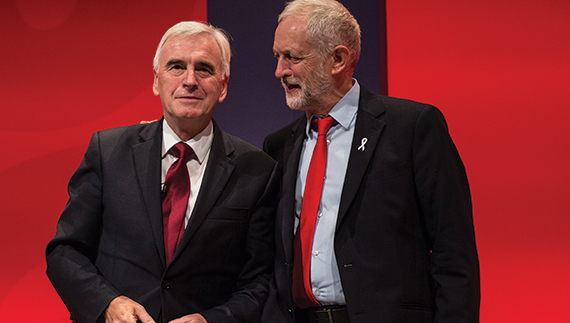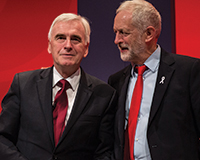 Gallows humour was rife among moderate councillors at the Labour Party conference. But behind the pained expressions lay a fear that the party’s lurch to the left could hamper the ability of Labour authorities to deliver development and work with the property industry.
Gallows humour was rife among moderate councillors at the Labour Party conference. But behind the pained expressions lay a fear that the party’s lurch to the left could hamper the ability of Labour authorities to deliver development and work with the property industry.
With Jeremy Corbyn returned with a strengthened mandate – and his chancellor John McDonnell taking to the stage soon after to say how “the old rules of the economy are being rewritten” – this year’s conference struck a divisive tone. As a result, many council leaders seeking to deliver homes, jobs and opportunity are finding more common cause with the property industry than with their own party leadership.
Property’s upper echelons were well represented in Liverpool, more reflecting a need to keep an open dialogue with Labour local authorities than an anticipation that they might persuade the national leadership of any shared ambition.
The British Property Federation fielded Land Securities chief executive Rob Noel and Crown Estate chief investment officer Paul Clark at its devolution-themed event on Tuesday morning. With Legal & General supporting a number of fringe sessions, head of real assets Bill Hughes was also in town to make the case for investment in real estate and infrastructure.
At a Mishcon de Reya dinner, a group of London borough leaders – including Southwark’s Peter John, Haringey’s Claire Kober and Barking & Dagenham’s Darren Rodwell – discussed effective working with developers and investors. L&G’s Hughes, Essential Living’s Daryl Flay, First Base’s Elliot Lipton and CapCo’s Anette Simpson were among their number.
Aspirations were largely shared. But there was recognition that for many urban conurbations – Labour’s local authority heartland – co-operation between the public and private sectors was about to become harder.
The threat was that should these local authorities work too closely with the property industry, their leaders would find themselves at risk of a challenge from within their own ranks.
Just as moderate MPs fear deselection as Labour moves to the left, centrist council leaders acknowledged that they may be turfed out by their own party and replaced with someone whose politics are closer to the party’s national leadership. “We’ve got policies that scare the pants off me,” one borough leader warned developers at the dinner. “And if we go, you’re left with Momentum.”
For some leaders, it’s a double whammy. Last week communities secretary Sajid Javid rejected Southwark’s application to CPO the Aylesbury estate as part of its estate regeneration programme. For the likes of borough leader Peter John, pressure is coming from both a different political party in government and from within his own party. It’s a trend not unique to Southwark.
Where many on all sides find comfort, however, is in the mayor’s office. Sadiq Khan’s deputy mayor for housing, James Murray, has impressed since he took on the role in May. Already developers and local authorities are looking to City Hall to help confront challenges.
For Khan and his team to be more effective, however, they need more devolved powers, particularly in raising revenues. And with more mayors set to be elected next year – and, given that they will be in major cities, more Labour mayors – it is a demand that will only grow.
That, at least, is something that unites more than it divides. Local and regional authorities want it, of course. Developers seek to work with pragmatic councils and greater powers will allow stand-out authorities to deliver the flexibility this sector craves. Even shadow chancellor John McDonnell has vowed to shift power away from London and Whitehall to the regions.
Will the government yield? George Osborne did. Will Philip Hammond follow suit? We should learn more at next week’s Conservative Party conference.
Other Labour Party promises
Make three-year leases the norm in private rented sector, to end the rise of homelessness
Commit to building a million homes in the next parliament, with half of those social housing, using the Housing and Planning Act to promote local government housebuilding
Shift investment-making power away from the City and Whitehall to the regions through measures including new regional development banks and a “comprehensive industrial strategy”
Establish a living wage of more than £10 per hour
Support access to single market in Brexit negotiations
Create £250bn investment programme for infrastructure, cheap low-carbon energy, superfast broadband and HS3
Crack down on tax avoidance, doubling the number of staff at HM Revenue & Customs investigating “wealthy tax avoiders” and enforcing
public company ownership registered in British Crown dependencies
Right to buy: arguments for and against
Labour would scrap Right to Buy if elected, shadow housing and planning minister Teresa Pearce said this week. She said the controversial policy, which allows council tenants to buy their homes at a discount of up to £103,900, made no sense at a “time of shortage”.
The policy, which in England has been extended to housing association tenants, has already been scrapped in Wales and Scotland. Pearce said: “The difference between us and the Tories is they think housing is about property, whereas we know it’s about homes, communities and life chances.”
Responding on Twitter, Conservative housing minister Gavin Barwell said: “Nothing better illustrates how out of touch Labour are with hard-working people than the announcement that they’ll abolish the Right to Buy.”
Labour had previously supported the policy, but mayor of London Sadiq Khan has called for greater assurances that properties would be replaced “like to like” in the same areas. The government has pledged to replace all properties.
However, some of its own leaders, including Mark Field, MP for Cities of London and Westminster, have raised concerns about the loss of “social capital” in London resulting from the policy, which has been extended to housing association tenants.











